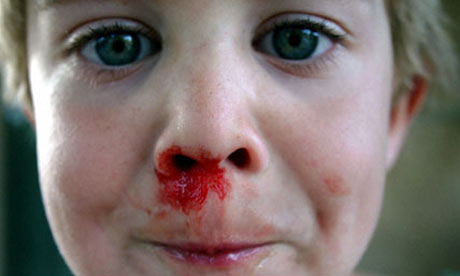
Nosebleed = Bleeding Disorder?
February 6th, 2014; Posted by: WeBleed staff
Does having a nosebleed mean that I have a bleeding disorder?
Your doctor or favorite medical website probably calls nosebleeds a scary, scientifically significant name like…epistaxis (spooky). And its true that people with hemophilia, von Willebrand disease, and other bleeding disorders often experience symptomatic, frequent and heavy nosebleeds.
The good news is that the majority of folks who find themselves with a bloody schnoz have nothing to worry about.
There are two different kinds of nosebleeds – anterior and posterior. Anterior nosebleeds make up the majority (90% according to WebMD) of all nosebleeds and come from the blood vessels that are near the tip of your honker. An anterior nosebleed can typically be contained and stopped at home without having to go see a doctor.
Posterior nosebleeds, which occur significantly less (but more often in the elderly) are bleeds from an artery in the back of the nose. These kind of bleeds may require assistance from a medical pro to help stop the gushing.
So…what causes a nosebleed?
Easy – trauma. Chances are that your snout is irritated due to a cold or allergies, you took a punch to the face, or you just have been picking it far too much. Irritation can also be prevalent in dry and or cold climates.
These kind of nosebleeds are best taken care of by tilting your head forward (so blood doesn’t go down your throat), pinching your nostrils closed using your thumb and forefinger at the point where the cartilage in your nose meets bone, hold this for about five minutes before letting go. If the bleeding has slowed or stopped you are applying pressure in the correct place – if not – start over and try higher or lower.
In the event that you don’t have a cold, you live in a mild to warm climate, you haven’t been punched, and you (honestly) haven’t been digging for green gold your nosebleed may be caused (though way less likely) by:
- A deviated septum
- Certain medications
- Liver Disease
- Abnormal blood vessels in your nose
- High Blood Pressure
- Cancers
- Cramming a foreign object up there
- A bleeding/clotting problem
If you are experiencing additional bleeding in other areas of your body (unexplained bruising, blood in urine or stool) you should reach out to your primary care provider as soon as possible.
Further reading: Nosebleeds from WebMD
Photo credit: Christina Kennedy/Alamy – The Guardian
webleed.org – your source for bleeding news!



